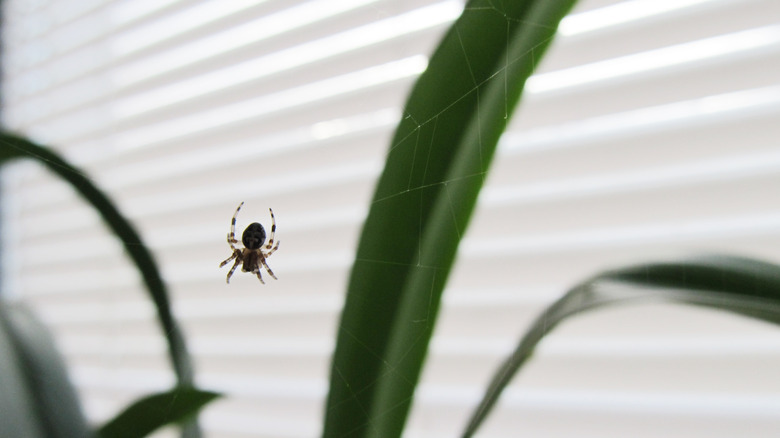The Spider Pest Control Remedy That Isn't Worth Your Time And Money
No one likes discovering that they have a spider infestation on their hands. Seeing a rogue spider once or twice a month is perfectly normal and manageable — after all, you can get rid of spiders with common household staples like cinnamon sticks or cayenne pepper. You can also vacuum them up or catch them with a glass and set them free outside. But an infestation is a whole other problem. During an infestation, you'll notice an uptick in spider webs, you'll find egg sacs, and you'll find a constant wave of spiders running across the floor or scurrying across walls. At that point, you'll be looking for more heavy-duty extermination solutions like store-bought bug bombs. However, according to pest control professionals, these don't necessarily work very well.
While bug bombs might sound effective on paper, they often fall short of eradicating your problem completely. Here's why bug bombs aren't worth your time or money when it comes to getting rid of spiders.
Why bug bombs aren't an effective spider-control solution
Let's take a deep dive into why spider bombs aren't the best solution to your problem. First, the ingredients used in the store-bought versions are primarily used to repel rather than kill arachnids. That means they will likely just drive them deeper into your house or into hidden crevices. They'll bunker down in their new hiding spots until the offending odor dissipates, and then come back out.
Second, the bug bomb doesn't envelop the entire room you set it off in. Instead, it will fog the floors or waist-high surfaces like countertops, but won't get higher than that. This means that the repellent will miss any spiders tucked into ceiling corners, hiding on top of taller furniture, or bunkered down inside walls or other hard-to-reach areas. Some might not even be strong enough to get to the corners of the room, which is where spiders tend to hide. Taking all of this into consideration, this particular product won't deliver the results you need if you're experiencing a stubborn infestation.
What to do instead
The first thing you need to do in the case of a spider infestation is make your home less hospitable to spiders. That means removing any potential hiding spots they might be attracted to. The easiest thing to do is remove any potential clutter from your home, whether that's stacked boxes in the basement or furniture you've been meaning to sell in the attic. Spiders love to build their webs in these cluttered, undisturbed spaces, so make sure you take this infestation as a chance to declutter. You also want to sweep and dust regularly in areas they like to hide, such as under furniture and in corners. Again, they're attracted to undisturbed areas, so thoroughly cleaning your house each week can make them move to a less-active environment. You also want to look for any cracks and crevices in your home that they might be sneaking in through, and seal them up. This will stop new spiders from coming in.
Once that's done, set up glue traps along baseboards, near spider webs, underneath furniture, and anywhere else you see spider activity. This will help you passively capture spiders. You can also use an insecticide that uses ingredients that specifically kill (and not just repel) spiders. However, if you have a bad infestation, this might not be enough. At that point, call a pest control professional.


